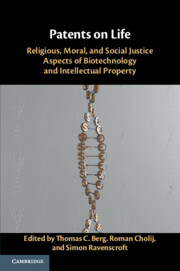 Patents on Life
Patents on Life Book contents
- Patents on Life
- Patents on Life
- Copyright page
- Contents
- Contributors
- Prefatory Note and Acknowledgements
- Opening
- I Life Patents, Law, and Morality
- II Religious Perspectives on Life Patents
- III Social Justice and Political Aspects
- 11 “Thou Shalt Not Steal”: The Morality of Compulsory Licensing of Pharmaceutical Patents
- 12 Genetic Resources and Patents: In Search of Ethical Solutions to Global IP Discord
- 13 Patents for Life: Toward an Ethical Use of Patents on Plant Innovations
- 14 Germline Modification of Human Embryos, Patents and the Limits of Markets: Rethinking Equality, Human Diversity and the Question of Innovation Funding
- 15 Patent Governance, Ethics and Democracy: How Transparency and Accountability Norms Are Challenged by Patents on Stem Cells, Gametes and Genome Editing (CRISPR) in Europe
- Closing
- Index
12 - Genetic Resources and Patents: In Search of Ethical Solutions to Global IP Discord
from III - Social Justice and Political Aspects
Published online by Cambridge University Press: 28 September 2019
- Patents on Life
- Patents on Life
- Copyright page
- Contents
- Contributors
- Prefatory Note and Acknowledgements
- Opening
- I Life Patents, Law, and Morality
- II Religious Perspectives on Life Patents
- III Social Justice and Political Aspects
- 11 “Thou Shalt Not Steal”: The Morality of Compulsory Licensing of Pharmaceutical Patents
- 12 Genetic Resources and Patents: In Search of Ethical Solutions to Global IP Discord
- 13 Patents for Life: Toward an Ethical Use of Patents on Plant Innovations
- 14 Germline Modification of Human Embryos, Patents and the Limits of Markets: Rethinking Equality, Human Diversity and the Question of Innovation Funding
- 15 Patent Governance, Ethics and Democracy: How Transparency and Accountability Norms Are Challenged by Patents on Stem Cells, Gametes and Genome Editing (CRISPR) in Europe
- Closing
- Index
Summary
This chapter considers the question of patents and genetic resources (GR), as currently being discussed in various international fora, in the light of the function of intellectual property. In particular, the chapter supports the proposal by developing countries, to require, in an international legal instrument, mandatory disclosure of the origin of genetic resources and associated traditional knowledge (TK) in patent applications, with a view to realising in an effective way fair and equitable benefits sharing as required by the Convention on Biological Diversity (CBD). This proposal has also been supported by the Vatican (Holy See) on the basis of Catholic social teaching, which this chapter discusses in condensed form. Mandatory disclosure would provide a structural mechanism to ensure that the fruits of exploitation of TK/GR benefit indigenous community, who are often poor and whose living habitats and way of life are often under threat.
Keywords
Information
- Type
- Chapter
- Information
- Patents on LifeReligious, Moral, and Social Justice Aspects of Biotechnology and Intellectual Property, pp. 209 - 226Publisher: Cambridge University PressPrint publication year: 2019